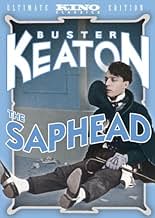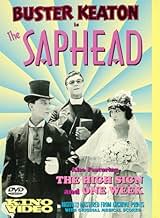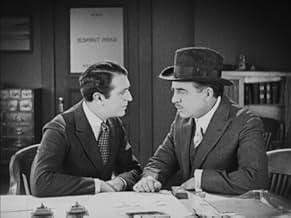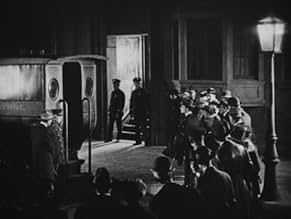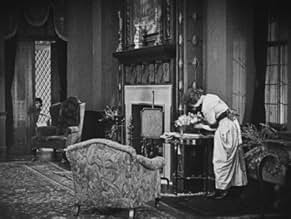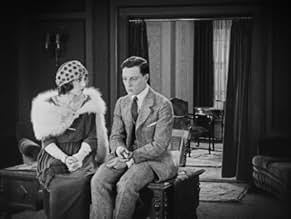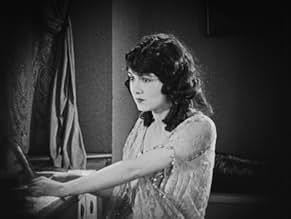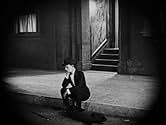IMDb-BEWERTUNG
6,1/10
1883
IHRE BEWERTUNG
Füge eine Handlung in deiner Sprache hinzuThe simple-minded son of a rich financier must find his own way in the world.The simple-minded son of a rich financier must find his own way in the world.The simple-minded son of a rich financier must find his own way in the world.
- Auszeichnungen
- 1 Nominierung insgesamt
Katherine Albert
- Hattie
- (Nicht genannt)
George Berrell
- Jim Hardy from Arizona
- (Nicht genannt)
Henry Clauss
- Valet
- (Nicht genannt)
Alfred Hollingsworth
- Hathaway
- (Nicht genannt)
Helen Holte
- Henrietta Reynolds
- (Nicht genannt)
Jeffrey Williams
- Hutchins
- (Nicht genannt)
Empfohlene Bewertungen
He's rich, he's a bit lazy, he gets the girl in the first half-hour, he even smiles a bit. It's not the Buster Keaton you expect. But he's still Keaton, and even if his first feature film creaks a good deal, he keeps you entertained.
"The Saphead" presents the story of Bertie Van Alstyne (Keaton), son of Wall Street tycoon Nicholas Van Alstyne (William H. Crane). Bertie lives a life of Manhattan luxury but secretly pines for the beautiful Agnes (Beulah Booker), who secretly pines for Bertie in turn. Happiness appears at hand until a strange turn of events shatters their union.
A 1920 production of a hit stage play, "The Saphead" was designed to fit audience conventions of the day, not showcase Keaton's still-emerging comic persona. Sentiment and improbable coincidences run rampant here. Given that, it's impressive how well the Keaton we would come to know is presented. He is given many chances to present his clownish athleticism, as well as that expressionless-yet-not-emotionless manner that has beguiled film lovers for decades.
Was Herbert Blaché, the credited director, preternaturally wise to Keaton's style? Or did Keaton just know how to get his way even before he enjoyed full control of his features?
The problem with "The Saphead" is not Keaton, but its construction. In the first ten minutes, we are introduced to everyone in the film except Bertie, and given background about an adulterous affair that is then dropped for the Bertie story. Forty-five minutes in the two story lines come together, and in such a convoluted way as to beggar belief. Bertie is somehow pressed into taking the blame for the affair, even though it's obvious his brother-in-law is the guilty party.
Cue violins. A lot of "The Saphead" works toward this kind of sentimental dithering, even the Keaton parts, which get a bit strange. Bertie confesses his love to Agnes accidentally, when he tells his sister Rose about it. (Since Nicholas Van Alstyne adopted Agnes, doesn't that make her Bertie's sister, too?) Agnes is standing right there, though, and gives Bertie a bit of a shock before he recovers and takes her hand. This is strictly Buster for the old ladies.
The best way of watching "The Saphead" is as a couple of clever Keaton shorts with workmanlike connecting material. The first short would be Bertie's attempt to live a wastrel life, not because his heart is in it, but because he believes the modern woman "prefers sports to saints". To this end, in a great bit of physical comedy, Bertie tries to get arrested when his speakeasy is raided even though he successfully bribed a detective without knowing it. Every time he tries to enter the paddy wagon, someone pushes him back out.
The second short would be Bertie making his way on Wall Street in the last 20 minutes, overdressed in top hat, frock coat, and spats, being razzed by the other brokers. This culminates in a scene of wild physical comedy where Keaton runs around the trading floor, jumping on people and unknowingly buying up shares in his father's precious mine.
The Kino DVD I saw this on also has two shorts Keaton made at the same time, "The High Sign" and "One Week", which display Keaton as both director and star, and in much sharper form. "The Saphead" lacks the inventiveness of those shorts, but it works off-and-on as period entertainment thanks to Keaton and a good supporting cast. Booker is a typically shy Keaton-film beauty who delivers her scenes with grace. Crane has a fine comic moment sending his disgraced son off with a check for one million dollars "and not a penny more!"
It's not great cinema, but it's the start of great cinema, showing some the conventions of the time Keaton would do his part to break, and other conventions he would observe, en route to glory.
"The Saphead" presents the story of Bertie Van Alstyne (Keaton), son of Wall Street tycoon Nicholas Van Alstyne (William H. Crane). Bertie lives a life of Manhattan luxury but secretly pines for the beautiful Agnes (Beulah Booker), who secretly pines for Bertie in turn. Happiness appears at hand until a strange turn of events shatters their union.
A 1920 production of a hit stage play, "The Saphead" was designed to fit audience conventions of the day, not showcase Keaton's still-emerging comic persona. Sentiment and improbable coincidences run rampant here. Given that, it's impressive how well the Keaton we would come to know is presented. He is given many chances to present his clownish athleticism, as well as that expressionless-yet-not-emotionless manner that has beguiled film lovers for decades.
Was Herbert Blaché, the credited director, preternaturally wise to Keaton's style? Or did Keaton just know how to get his way even before he enjoyed full control of his features?
The problem with "The Saphead" is not Keaton, but its construction. In the first ten minutes, we are introduced to everyone in the film except Bertie, and given background about an adulterous affair that is then dropped for the Bertie story. Forty-five minutes in the two story lines come together, and in such a convoluted way as to beggar belief. Bertie is somehow pressed into taking the blame for the affair, even though it's obvious his brother-in-law is the guilty party.
Cue violins. A lot of "The Saphead" works toward this kind of sentimental dithering, even the Keaton parts, which get a bit strange. Bertie confesses his love to Agnes accidentally, when he tells his sister Rose about it. (Since Nicholas Van Alstyne adopted Agnes, doesn't that make her Bertie's sister, too?) Agnes is standing right there, though, and gives Bertie a bit of a shock before he recovers and takes her hand. This is strictly Buster for the old ladies.
The best way of watching "The Saphead" is as a couple of clever Keaton shorts with workmanlike connecting material. The first short would be Bertie's attempt to live a wastrel life, not because his heart is in it, but because he believes the modern woman "prefers sports to saints". To this end, in a great bit of physical comedy, Bertie tries to get arrested when his speakeasy is raided even though he successfully bribed a detective without knowing it. Every time he tries to enter the paddy wagon, someone pushes him back out.
The second short would be Bertie making his way on Wall Street in the last 20 minutes, overdressed in top hat, frock coat, and spats, being razzed by the other brokers. This culminates in a scene of wild physical comedy where Keaton runs around the trading floor, jumping on people and unknowingly buying up shares in his father's precious mine.
The Kino DVD I saw this on also has two shorts Keaton made at the same time, "The High Sign" and "One Week", which display Keaton as both director and star, and in much sharper form. "The Saphead" lacks the inventiveness of those shorts, but it works off-and-on as period entertainment thanks to Keaton and a good supporting cast. Booker is a typically shy Keaton-film beauty who delivers her scenes with grace. Crane has a fine comic moment sending his disgraced son off with a check for one million dollars "and not a penny more!"
It's not great cinema, but it's the start of great cinema, showing some the conventions of the time Keaton would do his part to break, and other conventions he would observe, en route to glory.
"Saphead" is an awful romantic melodrama. Basically Keaton is just doing straight acting (the movie's based on a stage play). There is little comedy here.
But the 2 shorts included on the DVD -- "The High Sign" and "One Week" --are outstanding. They rate 8 and 9 scores, respectively. "One Week" anticipates many of Keaton's later gags and stunts, showing the kind of imagination and skill that made his films the funniest of the silent era (sorry, Charlie).
But the 2 shorts included on the DVD -- "The High Sign" and "One Week" --are outstanding. They rate 8 and 9 scores, respectively. "One Week" anticipates many of Keaton's later gags and stunts, showing the kind of imagination and skill that made his films the funniest of the silent era (sorry, Charlie).
The problem with this film is that it not a slapstick comedy and was never intended to be one, so if you are going to watch it forget about Buster Keaton, the comedian and look at Buster Keaton, the actor. Keaton is a revelation in this film, his performance is restrained and excellent proving that he was an actor as well as a comedian, a fact that makes his middle years even more sadder, truly a talent wasted by the studio system of the 30's. I'd like to add that Keaton had no problems adjusting to talkies, as commonly assumed, he had a fine speaking voice and could deliver a comic line perfectly, the problem lay with him losing control of his productions and being given poor quality material to work with, he never lost his talent as widely believed. All the performances in this little gem of a movie are first class especially Irving Cummings and William H Crane as well as Keaton's. This is a nice way to spend an hour, but, the final twenty minutes are the best as it is plain to see Keaton's contribution in the scenes in the Stock Exchange as Bertie runs around manically saying "I take it", but, not really knowing why. For many people, their only experience of silent movies is slapstick comedy, so I would say broaden your horizons and start with this one.
If there is any humor in this movie, it is carefully concealed. Buster Keaton gives an energetic performance in what is otherwise a dubious attempt at self-effacing humor. Now, under certain circumstances self- effacing humor can be effective but not in this movie. The story is contrived, and Mr. Keaton's character is so shallow that one must wonder why anyone would pay him any attention at all. Irving Cummings and William Crane carry this movie. They give strong dramatic performances. Mr. Keaton's attempt at humor through deadpan is out of place in this movie. It simply is not funny. It does not generate laughs. Nor is his character particularly lovable. His character, Bertie, is spoiled and shallow. His love interest with the female lead is strained and entirely implausible. The plot is predictable. The movie does have some effective moments, such as when the Crane and Cummings characters confront each other and the frantic scenes of trading on the floor of the stock market, but otherwise the movie's value lies mostly in the its status as a quaint antique of movie making from a bygone era.
Before I watched "The Saphead" I was under the impression that it was a Buster Keaton comedy, rather than a straight drama that starred Buster Keaton. For the first twenty minutes or so I was rather confused by the lack of jokes but then after a quick Google search I figured out what was happening.
After I realised what the nature of the film was, I found it pretty enjoyable. It's nothing special but it also isn't totally forgettable. The story may not be totally original but it did have some interesting beats in it that I wasn't expecting.
Keaton does a really good job in this role, and he even gets some moments to show off his comedic talents to the audience (the most notable being the stock market scene, which gets some decent laughs).
So yeah, overall it's nothing special but it's a decent watch and the feature film debut of a comedy legend.
After I realised what the nature of the film was, I found it pretty enjoyable. It's nothing special but it also isn't totally forgettable. The story may not be totally original but it did have some interesting beats in it that I wasn't expecting.
Keaton does a really good job in this role, and he even gets some moments to show off his comedic talents to the audience (the most notable being the stock market scene, which gets some decent laughs).
So yeah, overall it's nothing special but it's a decent watch and the feature film debut of a comedy legend.
Wusstest du schon
- WissenswertesFeature-film debut of Buster Keaton.
- PatzerWhen Bertie's car pulls up to the house after the aborted wedding, the front gate is closed, but when he gets out of the car it is wide open.
- Alternative VersionenIn 1995, Film Preservation Associates copyrighted a version with an orchestral score; no details were specified on the print.
- VerbindungenFeatured in Buster Keaton - Sein Leben, sein Werk (1987)
Top-Auswahl
Melde dich zum Bewerten an und greife auf die Watchlist für personalisierte Empfehlungen zu.
- How long is The Saphead?Powered by Alexa
Details
- Erscheinungsdatum
- Herkunftsland
- Sprache
- Auch bekannt als
- Buster Keaton auf der Börse
- Produktionsfirma
- Weitere beteiligte Unternehmen bei IMDbPro anzeigen
- Laufzeit
- 1 Std. 17 Min.(77 min)
- Sound-Mix
- Seitenverhältnis
- 1.33 : 1
Zu dieser Seite beitragen
Bearbeitung vorschlagen oder fehlenden Inhalt hinzufügen

